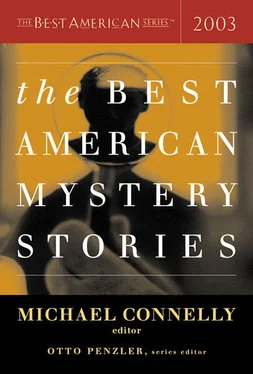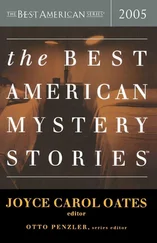A shaky smile comes to Smutt’s thin lips. “I don’t have it.”
“Then die.” Gordon cocks the hammer — for effect — and points the Bersa between Smutt’s eyes.
Raising his hands, Smutt stammers, “Come on, now. Gimme a minute.”
“You’ll have the money in a minute?” Gordon’s hand remains steady as he closes his left eye and aims carefully at the small dark mole between Smutt’s eyebrows. The loud blast of a ship’s horn causes Smutt to jump. Gordon is unmoved.
As long seconds tick by, Gordon takes the slack up in the trigger and starts to pull it slowly. Staring eye-to-eye, Smutt blinks.
“I got six grand,” Smutt says.
Gordon’s trigger finger stops moving, but his hand remains steady. He blinks and nods.
“Where?”
“On me.”
“Where?”
Smutt wipes away the sweat rolling down the sides of his face and exhales loudly. “For a minute there I thought—”
“Where?” Gordon interrupts.
Leaning back on his hands, Smutt looks around the room.
Gordon raises his size-eleven shoe and kicks him in the left shin. Smutt shrieks and grabs his leg. He rocks back and forth twice before Gordon presses the muzzle of the Bersa against the man’s forehead.
“Where?” Gordon growls.
“Under the bed.” Smutt rubs his shin with both hands. “Under the floorboard.”
Gordon grabs the seersucker suit collar with his left hand and yanks Smutt off the bed, shoving the man to the floor. Kicking the bed aside, Gordon orders Smutt to pull up the floorboard.
“Come up with anything except money and you’re dead.”
On his hands and knees now, Smutt crawls over to where his bed used to stand. Reaching for the loose board, he looks up at Gordon and says, “We have to come to an understanding.”
Gordon points the Bersa at the floor next to Smutt’s hand and squeezes off a round. A pop is followed by the sound of the shell casing bouncing on the wood floor.
Smutt looks at the neat hole next to his hand, looks back at Gordon, then yanks up the loose board. He reaches inside and pulls out a brown paper bag. He hands it to Gordon without looking up.
Snatching the bag, Gordon takes a couple of steps back. He opens the bag and quickly counts the money. Six grand exactly.
“You’re nine thousand short.”
Smutt rolls over on his butt and sits like a Buddha, hand on his knees. He wipes the sweat away from his face again and says, “Mr. Happer will just have to understand. You just came into this but it’s been goin’ on awhile. I need time. Most of the fifteen is vig... interest. You know.”
Gordon points the Bersa at the mole again. “You’re certain this is all you have?”
Smutt nods slowly, looking at the floor now. He waves a hand around. “Does it look like I got more?”
“Try yes or no!”
“No!” Smutt’s voice falters and he clears his throat.
“I heard you won more than this at the Fairgrounds.”
“Well, you heard wrong.”
Gordon waits.
Smutt won’t look up.
So Gordon asks, “Why deny it? You cleared over twenty thousand.”
“I had other bills to pay.”
“Before Mr. Happer?” Gordon’s voice is deep and icy.
“I told you this has been going on awhile. I need time.”
“You shoulda thought of that before. Now look at me.” Gordon closes his left eye again.
Smutt looks up and Gordon squeezes off a round that strikes just to the left of the mole. Smutt shudders and bats his eyes. Gordon squeezes off another shot, this one just to the right of the mole. Smutt’s mouth opens and he falls slowly forward, face first, in his lap.
Gordon steps forward and puts two more in the back of the man’s head.
Then he carefully picks up the spent casings, all five of them, and puts them in his coat pocket. The air smells of gunpowder now and faintly of blood. He searches the body and finds another four hundred in Smutt’s coat pocket. Still on his haunches, Gordon looks inside the hole in the floor, but there’s nothing else there.
He ransacks the room before leaving.
The night air feels damp on his face as he walks around the corner to where he’d squirreled away his low-riding Cadillac.
Gordon checks his watch as he ascends the exterior stairs outside the Governor Nicholls Street Wharf. It’s nine o’clock a.m., sharp. He looks across the river at the unpainted Algiers Wharf. Shielding his eyes from the morning sun glittering off the river, he can almost make out the window of Smutt’s room.
At the top of the stairs, he enters a narrow hall and moves to the first door. He knocks twice and waits, looking up at the surveillance camera. He straightens his ice-blue tie. This morning Gordon wears his tan suit with a dark blue shirt. Before leaving home, he told himself in his bathroom mirror that he looked “spiffy.”
The door buzzes and he pulls it open.
Mr. Happer sits behind his wide desk. Facing the TV at the far edge of his desk, next to the black videocassette recorder, the old man doesn’t look up as Gordon crosses the long office. Happer looks small, hunkered down in the large captain’s chair behind the desk.
The office smells of cigar smoke and old beer. The carpet is so old it’s worn in spots. Gordon takes a chair in front of Mr. Happer’s desk and pulls out an envelope, which he places on the desk.
Raising a hand like a traffic cop, Mr. Happer leans forward to pay close attention to the scene on his TV. Gordon doesn’t have to look to know what’s on the screen. It’s Peter Ustinov again and that damn movie Mr. Happer watches over and over. By the sound of it, Ustinov and David Niven are slowly working their way through the murder on the riverboat. What was the name of that French detective Ustinov plays? Hercules something-or-another.
Mr. Happer suddenly turns his deep-set black eyes to Gordon.
Pushing seventy, Mr. Happer is a skeleton of a man with razor-sharp cheekbones, sunken cheeks, and arms that always remind Gordon of the films of those refugees from Dachau. Mr. Happer reaches with his left hand for the envelope on his desk, picks it up with his spider’s fingers, and opens it.
“That’s all Smutt had on him,” Gordon volunteers.
Mr. Happer nods and says, “Four hundred?” He focuses those black eyes on Gordon and says, “What about the twenty grand from the Fairgrounds.”
Gordon is careful as he looks back into the man’s eyes. He shrugs. “He said he had other bills to pay.”
“Before me?”
“That’s what I said to him.”
“So?”
“So I took care of him. Tossed the room and that’s it.”
Mr. Happer shakes his head. Gordon watches him and remembers the man’s name isn’t Happer either. The old bastard was born Sam Gallizzio and tried for most of his life to become a made man, working at the periphery of La Cosa Nostra. Trying to be a goomba, Happer failed. He did, however, manage to remain alive, which isn’t easy for an Italian gangster who’s not LCN, even if he’s only a semi-gangster.
Shoving the envelope into a drawer, Mr. Happer pulls out another envelope, which he slides across the desk to Gordon.
Gordon picks it up and slips it into his coat pocket. He doesn’t have to count it. He knows there’s a thousand in there — the old bastard’s cut-rate hit fee.
Mr. Happer picks up a stogie from an overflowing ashtray and slicks it in his mouth. He sucks on it and its tip glows red. He shakes his head again.
“It’s worth it,” Mr. Happer says, as if he needs convincing. “The word’ll get out. Make it easier later on. That’s what the big boys do.”
Gordon nods.
“He woulda never come up with the fifteen,” Mr. Happer says, and Gordon wonders if the old man is baiting him. “He woulda never paid me.”
Читать дальше












